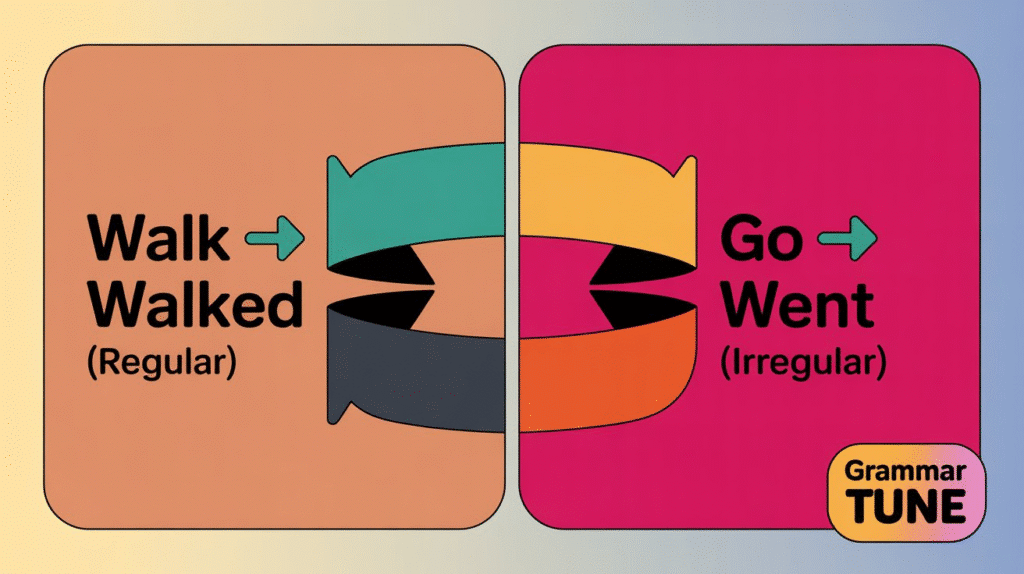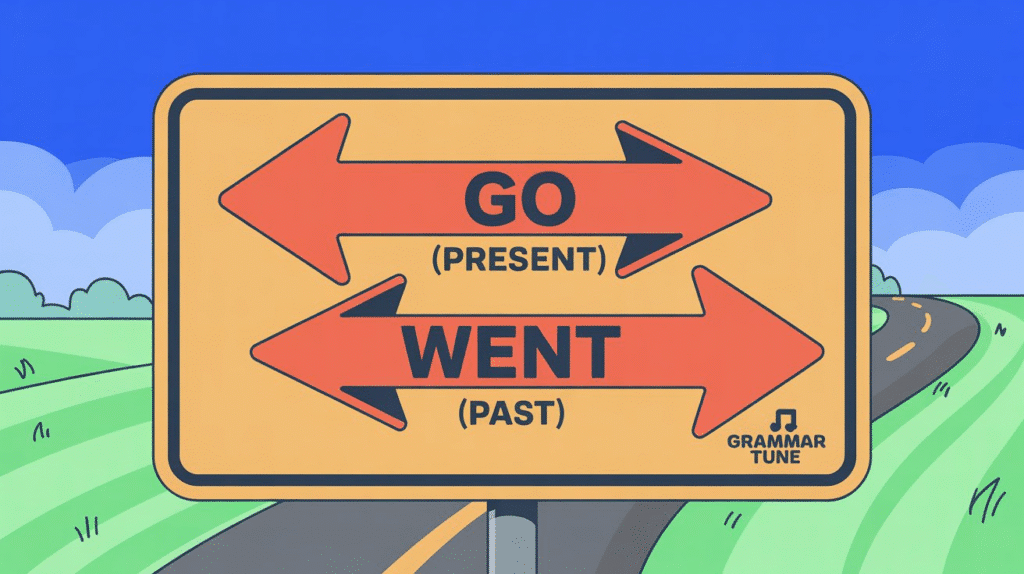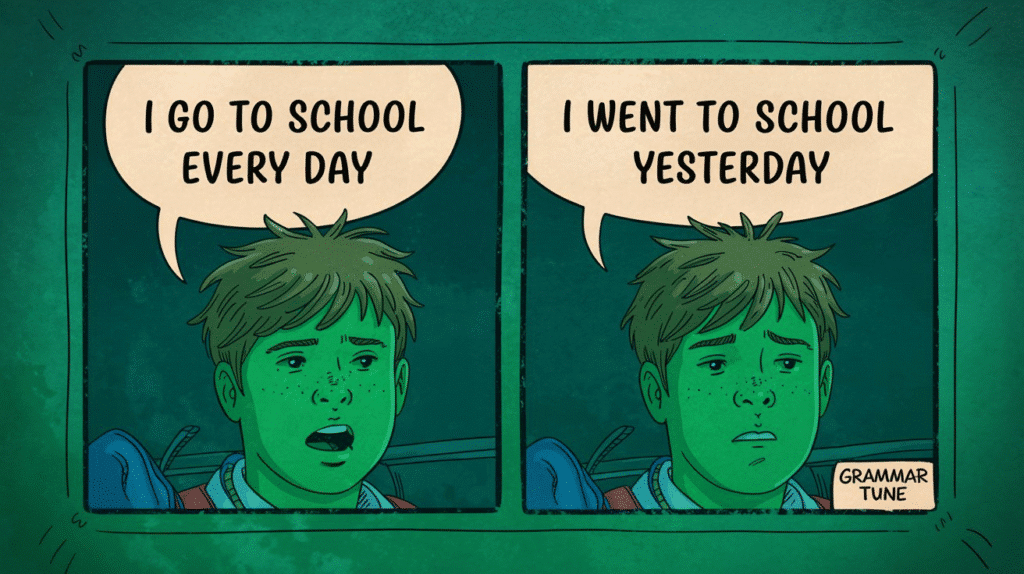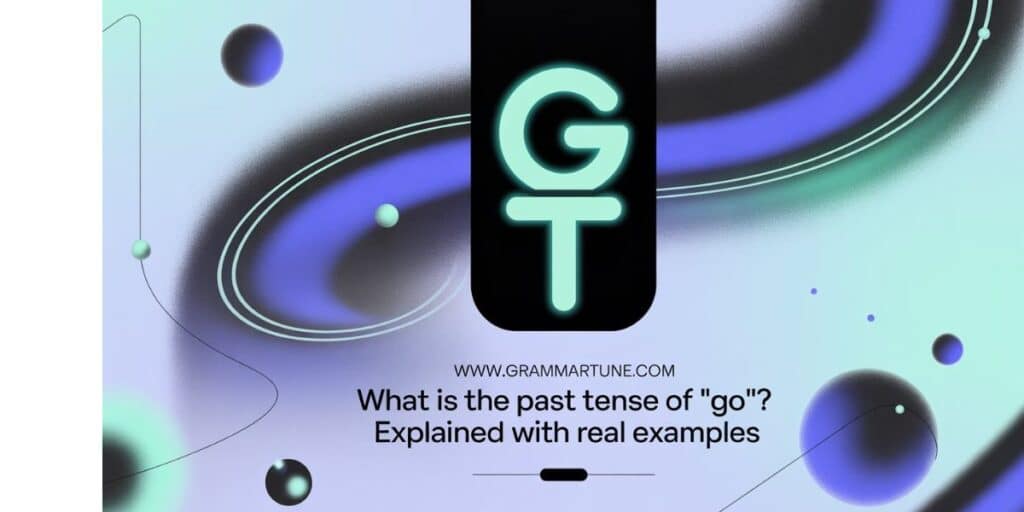What is the Past Tense of “Go”?A usual inquiry that numerous student does ask in English goes: Nowadays, it is really a common question for English learners to ask ‘give a concrete example’- For example, the focus word is the verb go, which is also among the most frequently used irregular verbs.
Even the past tense sometimes confuses the learners, owing to how went appears differential from the verb it is altering. Some, however, recognize that the past tense is gone; they understand it as the past participle.
In this guide, you’ll learn the correct usage with rules, examples, and a comparison chart for better understanding.
Understanding the Past Tense of Go

The verb go is an irregular verb, which means it doesn’t follow the regular rule of adding -ed.
- ✅ Correct past tense of go = went
- ❌ Gone is not the simple past tense. Instead, gone is the past participle.
Examples:
- Present: I go to the park.
- Past: I went to the park.
- Perfect tense: I have gone to the park.
must read: Letter or Alphabet: Understanding the Difference
What It Means:

So, what’s the past tense of go? The correct form is went.
It looks completely different from “go,” which is why it feels tricky. This is because English borrowed went from the Old English verb wend (meaning “to turn or change direction”).
Over time, the verb forms merged, and went became the accepted past tense of go. That’s why mastering this verb is essential for clear storytelling in the past tense.
Examples:
Here are some real-life examples showing the difference between present and past tense:
| Time | Sentence Example | Verb Used |
| Present | I go to school every day. | go |
| Past | I went to school yesterday. | went |
| Present | They go to the party weekly. | go |
| Past | They went to the party last week. | went |
| Present | We always go for a walk. | go |
| Past | We went for a walk last night. | went |
Notice how in the past tense, “go” becomes “went” to show that the action already happened.
Journey to the Past: Went

When we use went as the past tense, we describe an action that has already happened.
Examples:
- She went to New York last summer.
- We went out for dinner on Friday.
- He went home after the party.
Each sentence shows a completed action in the past, making went a key word for storytelling.
You will like: Metaphor vs Idiom: What’s the Difference?
Go vs Went (Quick Comparison)
| Verb Tense | Base Form | Past Tense | Example Sentence |
| Present | go | — | I go to school. |
| Past | — | went | I went to school. |
| Incorrect | goed ❌ | — | I goed to school. (Wrong) |
Example:

“I went on a road trip with my friends last week. We went hiking by a river after crossing the mountain pass. When the sun set behind the hills, we went to a campfire spot to share stories.
It was an adventure I’ll never forget.” This shows how went forms the backbone of past-tense storytelling.
Present vs. Past: A Quick Recap

When talking about something happening now, use go. When referring to something that already happened, use went.
| Situation | Present Tense Example | Past Tense Example |
| Going to school | I go to school every day. | I went to school yesterday. |
| Traveling | We go on trips often. | We went to Spain last summer. |
| Shopping | She goes shopping weekly. | She went shopping last Saturday. |
Choosing the Right Expression
Using go instead of went can completely change your sentence.
Examples:
- ✅ Asking a question: Did you go to the market?
- ✅ Storytelling: I went to the party, saw old friends, and danced all night.
- ✅ Writing reports: The students went to the museum as part of a school project.
Examples:
- He went to the dentist last Monday.
- They went hiking in the forest.
- We went out for pizza.
- I went home early because I was tired.
- She went to work despite the rain.
Common Verbs and Their Past Forms (Including Go)
| Verb (Present) | Past Tense | Type |
| go | went | Irregular |
| play | played | Regular |
| eat | ate | Irregular |
| walk | walked | Regular |
| drink | drank | Irregular |
Go vs Went in Different Tense Usage
| Tense Type | Example with Go | Example with Went |
| Present Simple | I go to class. | — |
| Past Simple | — | I went to class. |
| Question Form | Do you go to class? | Did you go to class? |
| Negative Form | I don’t go to class. | I didn’t go to class. |
Final Thoughts
The past tense of go is always went. The form gone is the past participle and is only used with helping verbs (have, has, had).
To sound natural and accurate in English:
- ✅ Use went for past tense.
- ✅ Use gone only in perfect tenses.
FAQs
What is the past tense of go?
The past tense of go is went.
Is gone ever used as a past tense?
No, gone is the past participle and must be used with have/has/had.
What type of verb is go?
Go is an irregular verb.
How do I remember the difference between went and gone?
Use went alone, but gone always with have/has/had.
Can I say “I’m gone” in English?
No, the correct form is where I went.

Joulia, a seasoned wordsmith and grammar enthusiast, brings over a decade of blogging expertise to Grammar Tune. With a keen eye for linguistic precision and a passion for making complex grammar concepts accessible, he has helped thousands of readers enhance their writing skills. His engaging teaching style and practical approach to language learning have made him a trusted voice in the online grammar community.







